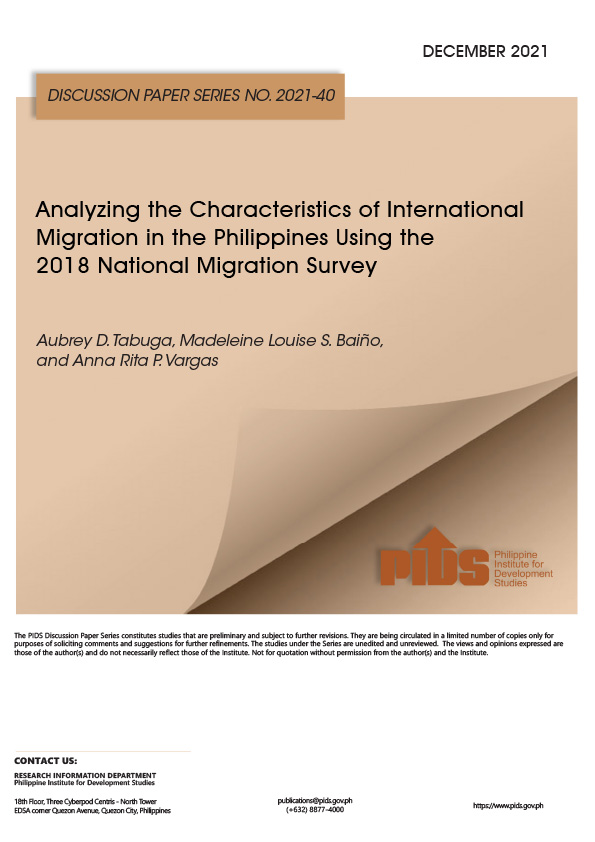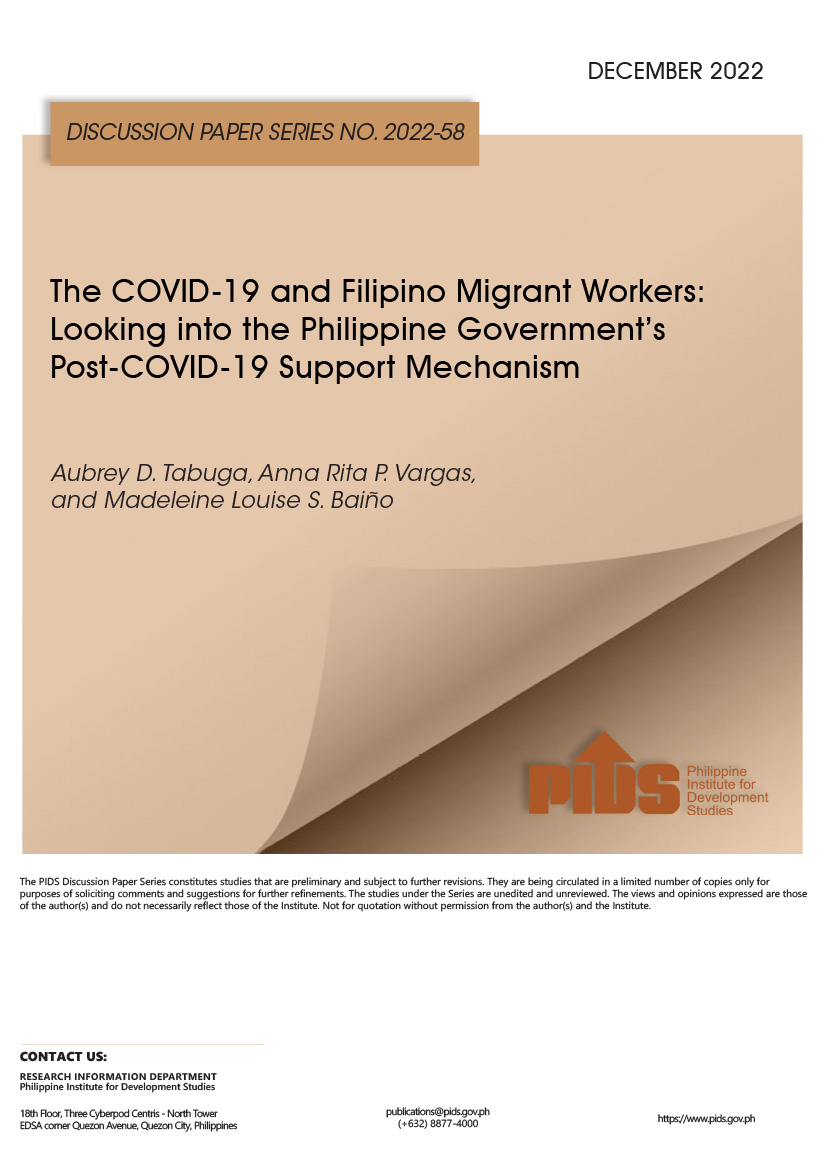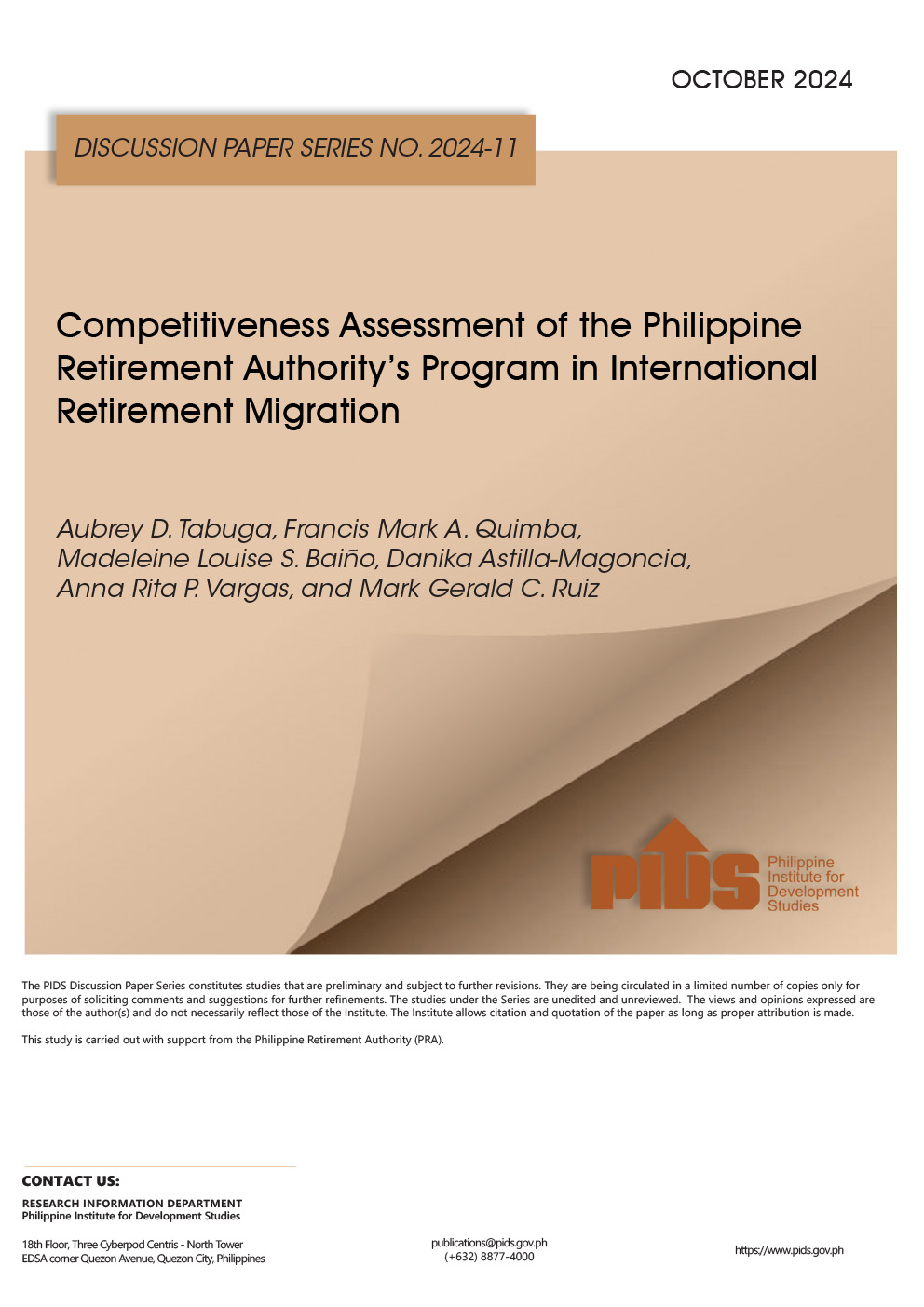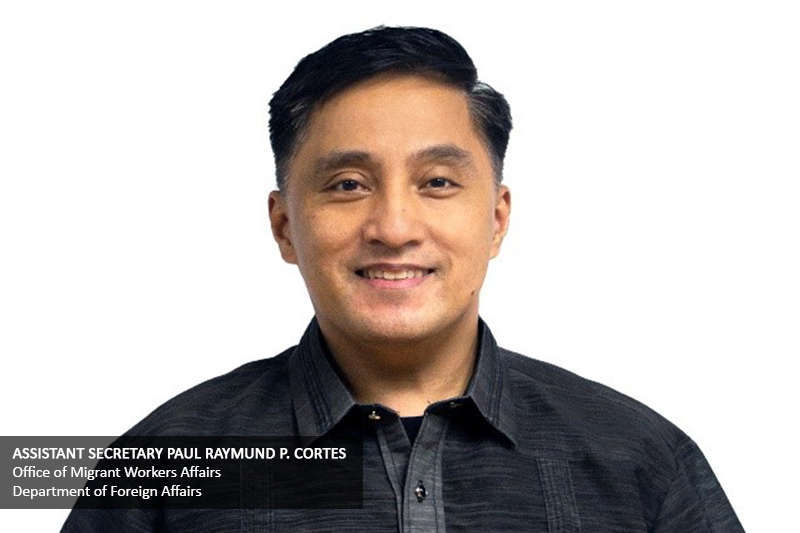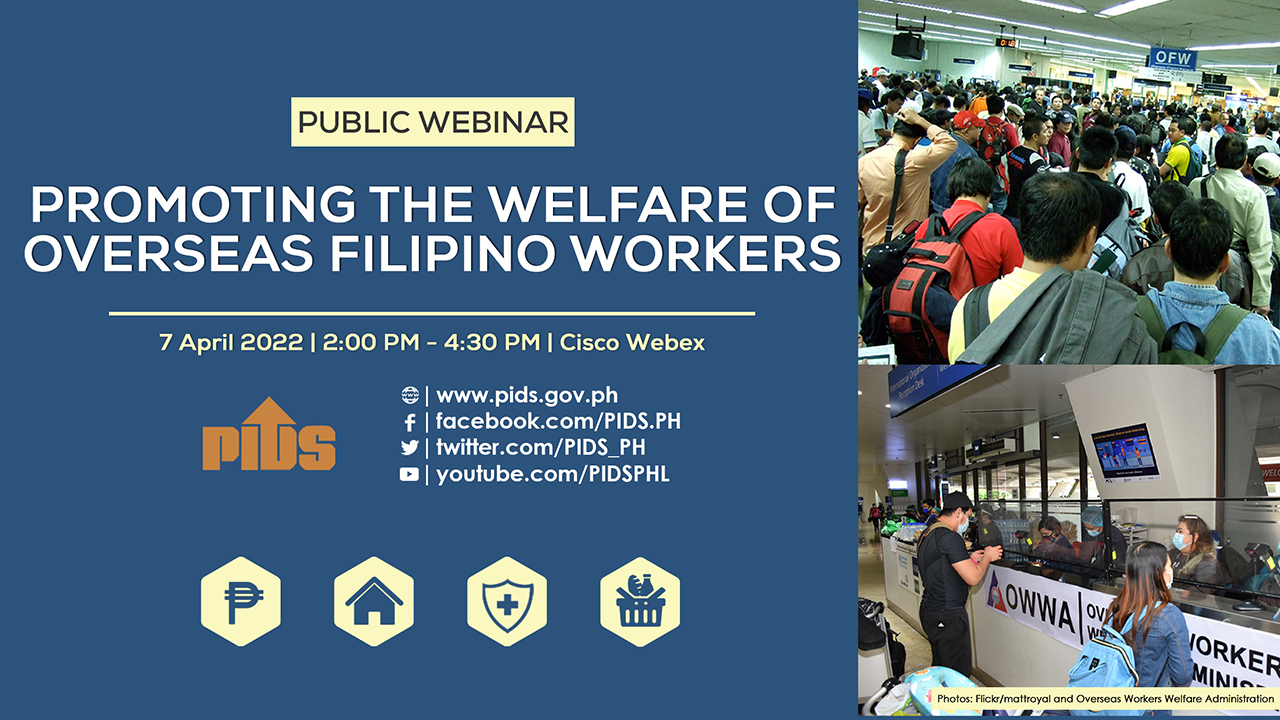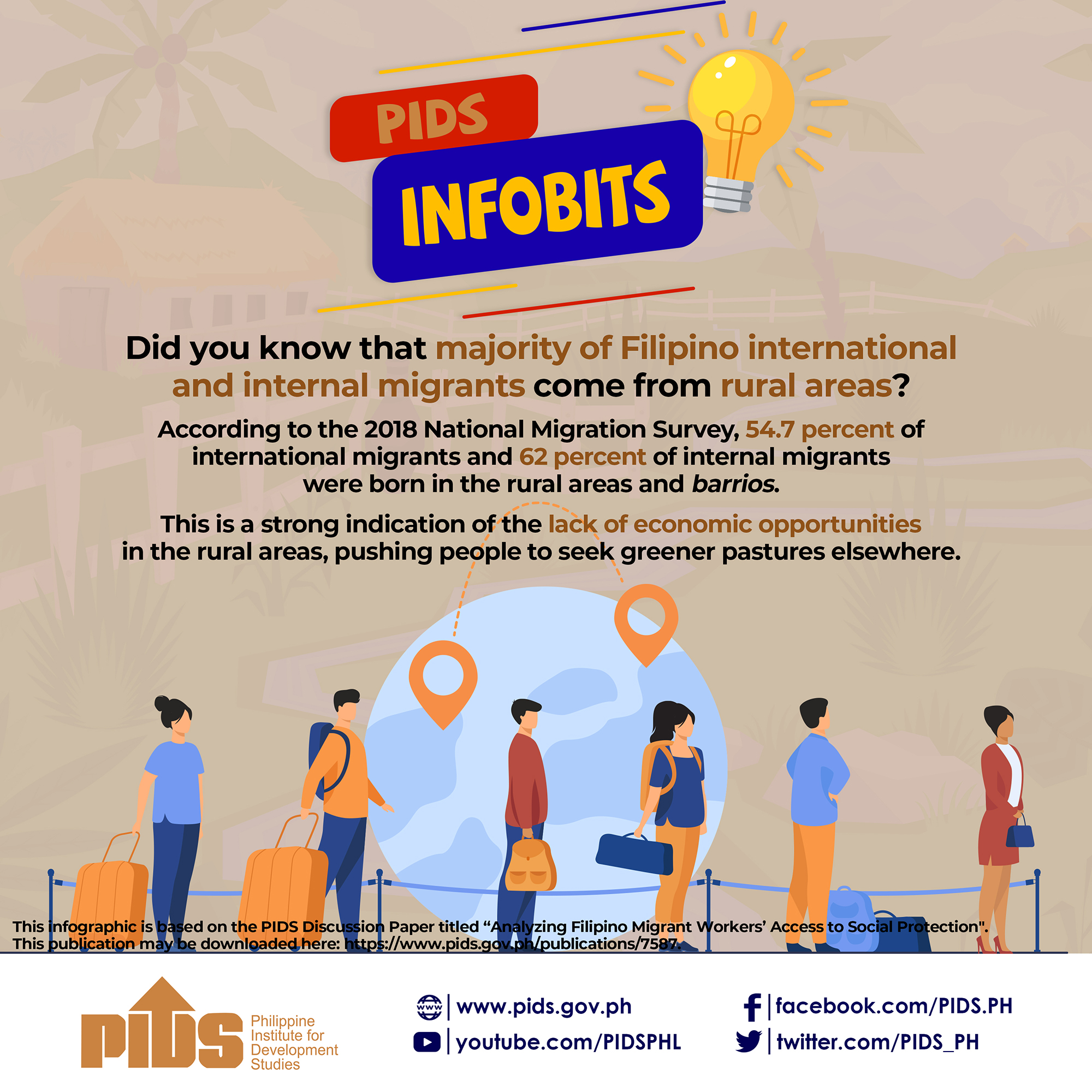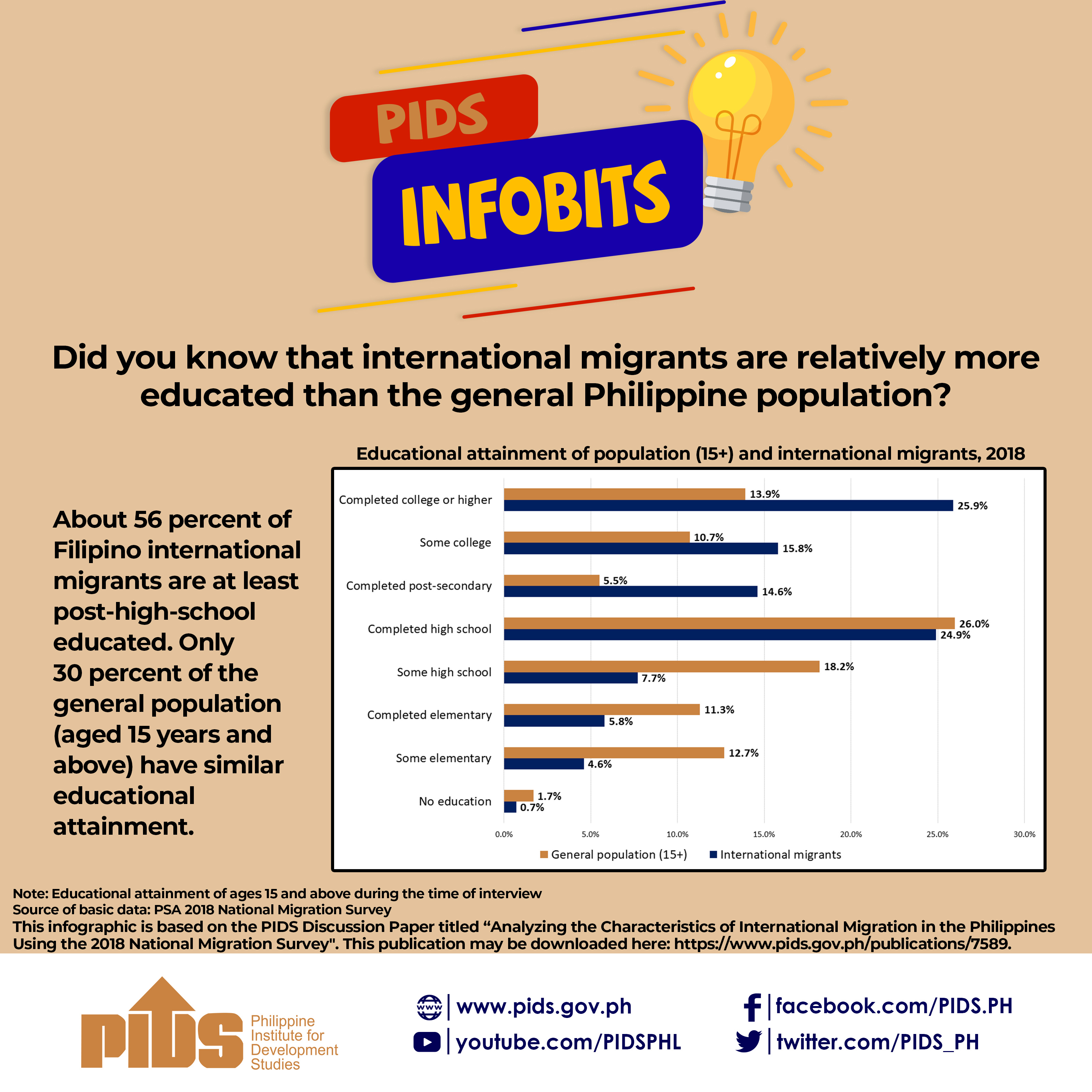The European migrant crisis will not have large, adverse effects on the Philippines, according to a Malta-based economist in a presentation at a seminar hosted by state think tank Philippine Institute for Development Studies (PIDS) last April 11.
While the distance between Europe and the Philippines makes it difficult to imagine how the crisis can affect the country, the breakdown of trust among European nations and the tightening of borders put free movement in the continent at risk, while hostilities against migrants intensify.
But according to Prof. Lino Briguglio of the University of Malta, Filipinos who work in the European Union (EU) need not worry about the crisis.
"The Filipino people have a very good reputation in Europe," remarked Briguglio.
"They often occupy jobs that are in demand. The migrant crisis will impact your overseas workforce as far as the tightening of visa rules and requirements is concerned. If the EU collapses, the issue of stricter border rules will be a problem that the whole Europe and other foreigners will face and not just your Filipino expats," he explained further.
Meanwhile, PIDS President Gilberto Llanto said the European migrant crisis has been pegged as one of the big global shocks of this year. Because shocks do not occur in silos, they directly affect other potential and ongoing risks given the interconnected nature of threats to global, regional, and national stability.
"This puts the onus on policymakers to evaluate in-depth how something as critical as the European migrant crisis could possibly affect a far-off country like the Philippines," Llanto added.
Llanto also noted that Briguglio's presentation about the EU migrant crisis is in line with PIDS' agenda of enriching the national discourse on building resilience against an array of risks.
Briguglio pointed out three dimensions of the migrant crisis. According to Briguglio, the EU migration crisis has three dimensions and these are associated with border control, granting of asylum, and humanitarian considerations.
"Geography has dictated the disproportionate distribution of responsibility among European countries in dealing with the crisis. Europe's legislative guide to dealing with migrants is embodied in the Dublin Regulation, which places responsibility of temporarily keeping and legitimizing asylum seekers on the first country migrants arrive in. Because most migrants originate from the Maghreb, South Asia, and the Middle East, nations like Greece, Italy, Malta, and Eastern European countries like Hungary bear majority of that responsibility," he explained.
In addition, Briguglio pointed out a conundrum in identifying legitimate asylum seekers from migrants seeking economic opportunity.
"Part of what makes the European migrant crisis unprecedented is the sheer volume of people. Leaving it up to the border countries is unsustainable. Currently, only a very small proportion of migrants have actually been resettled outside of the entry-point countries," he said.
Briguglio also criticized the EU's lack of an effective strategy in dealing with the crisis, calling it a "crisis of solidarity".
"The humanitarian aspect of the crisis is forgotten in the scramble to flee from the responsibility of responding to and helping manage the influx of people. Instead of highlighting the issue from a humanitarian angle, whereby the fact that the vast majority of migrants are normal people running away from war, the crisis has given rightist groups an opportunity to wage an anti-immigrant political agenda across European states. The issue has become extremely polarized on the issue of religion and cultural compatibility, with little room for finding both pragmatic and humane solutions," he explained.
Overall, the refugee crisis, according to Briguglio, is a multifaceted issue. He added that peace in the Middle East is the most ideal solution to stop the influx of migrants to the EU. However, he admitted that it is also the hardest and farthest from being accomplished in the near future.
According to Briguglio, the EU strategists need to focus on strengthening Europe's capacity to receive asylum seekers and expedite the processing procedure. He suggested that Europe has to create a common European asylum system to harmonize the treatment of asylum seekers and refugees, and more importantly, to share the burden of responsibility equally among EU countries. The researcher also recommended making targeted policies that would integrate migrants into the labor market.
"Employment would reduce cultural tensions and the cost of hosting irregular migrants. Policymakers will have to sort out and reduce skill mismatches, address and minimize language barriers, and protect the migrants from further exploitation," he stated.
Interestingly, during the seminar's open forum, an audience member revealed that Europe could learn a thing or two about managing migrants and refugees from the Philippines.
The Philippines is one of only a handful of signatories to the 1952 Refugee Convention with a clear procedure on managing refugees. A Refugee and Stateless People Protection Unit under the Department of Justice regularly deals with refugees from countries like Syria and Pakistan, more often than the public is aware of. In 2012, the United Nations lauded the Philippines for establishing an emergency transit mechanism to help process refugee application papers and assist irregular migrants. ###
While the distance between Europe and the Philippines makes it difficult to imagine how the crisis can affect the country, the breakdown of trust among European nations and the tightening of borders put free movement in the continent at risk, while hostilities against migrants intensify.
But according to Prof. Lino Briguglio of the University of Malta, Filipinos who work in the European Union (EU) need not worry about the crisis.
"The Filipino people have a very good reputation in Europe," remarked Briguglio.
"They often occupy jobs that are in demand. The migrant crisis will impact your overseas workforce as far as the tightening of visa rules and requirements is concerned. If the EU collapses, the issue of stricter border rules will be a problem that the whole Europe and other foreigners will face and not just your Filipino expats," he explained further.
Meanwhile, PIDS President Gilberto Llanto said the European migrant crisis has been pegged as one of the big global shocks of this year. Because shocks do not occur in silos, they directly affect other potential and ongoing risks given the interconnected nature of threats to global, regional, and national stability.
"This puts the onus on policymakers to evaluate in-depth how something as critical as the European migrant crisis could possibly affect a far-off country like the Philippines," Llanto added.
Llanto also noted that Briguglio's presentation about the EU migrant crisis is in line with PIDS' agenda of enriching the national discourse on building resilience against an array of risks.
Briguglio pointed out three dimensions of the migrant crisis. According to Briguglio, the EU migration crisis has three dimensions and these are associated with border control, granting of asylum, and humanitarian considerations.
"Geography has dictated the disproportionate distribution of responsibility among European countries in dealing with the crisis. Europe's legislative guide to dealing with migrants is embodied in the Dublin Regulation, which places responsibility of temporarily keeping and legitimizing asylum seekers on the first country migrants arrive in. Because most migrants originate from the Maghreb, South Asia, and the Middle East, nations like Greece, Italy, Malta, and Eastern European countries like Hungary bear majority of that responsibility," he explained.
In addition, Briguglio pointed out a conundrum in identifying legitimate asylum seekers from migrants seeking economic opportunity.
"Part of what makes the European migrant crisis unprecedented is the sheer volume of people. Leaving it up to the border countries is unsustainable. Currently, only a very small proportion of migrants have actually been resettled outside of the entry-point countries," he said.
Briguglio also criticized the EU's lack of an effective strategy in dealing with the crisis, calling it a "crisis of solidarity".
"The humanitarian aspect of the crisis is forgotten in the scramble to flee from the responsibility of responding to and helping manage the influx of people. Instead of highlighting the issue from a humanitarian angle, whereby the fact that the vast majority of migrants are normal people running away from war, the crisis has given rightist groups an opportunity to wage an anti-immigrant political agenda across European states. The issue has become extremely polarized on the issue of religion and cultural compatibility, with little room for finding both pragmatic and humane solutions," he explained.
Overall, the refugee crisis, according to Briguglio, is a multifaceted issue. He added that peace in the Middle East is the most ideal solution to stop the influx of migrants to the EU. However, he admitted that it is also the hardest and farthest from being accomplished in the near future.
According to Briguglio, the EU strategists need to focus on strengthening Europe's capacity to receive asylum seekers and expedite the processing procedure. He suggested that Europe has to create a common European asylum system to harmonize the treatment of asylum seekers and refugees, and more importantly, to share the burden of responsibility equally among EU countries. The researcher also recommended making targeted policies that would integrate migrants into the labor market.
"Employment would reduce cultural tensions and the cost of hosting irregular migrants. Policymakers will have to sort out and reduce skill mismatches, address and minimize language barriers, and protect the migrants from further exploitation," he stated.
Interestingly, during the seminar's open forum, an audience member revealed that Europe could learn a thing or two about managing migrants and refugees from the Philippines.
The Philippines is one of only a handful of signatories to the 1952 Refugee Convention with a clear procedure on managing refugees. A Refugee and Stateless People Protection Unit under the Department of Justice regularly deals with refugees from countries like Syria and Pakistan, more often than the public is aware of. In 2012, the United Nations lauded the Philippines for establishing an emergency transit mechanism to help process refugee application papers and assist irregular migrants. ###

